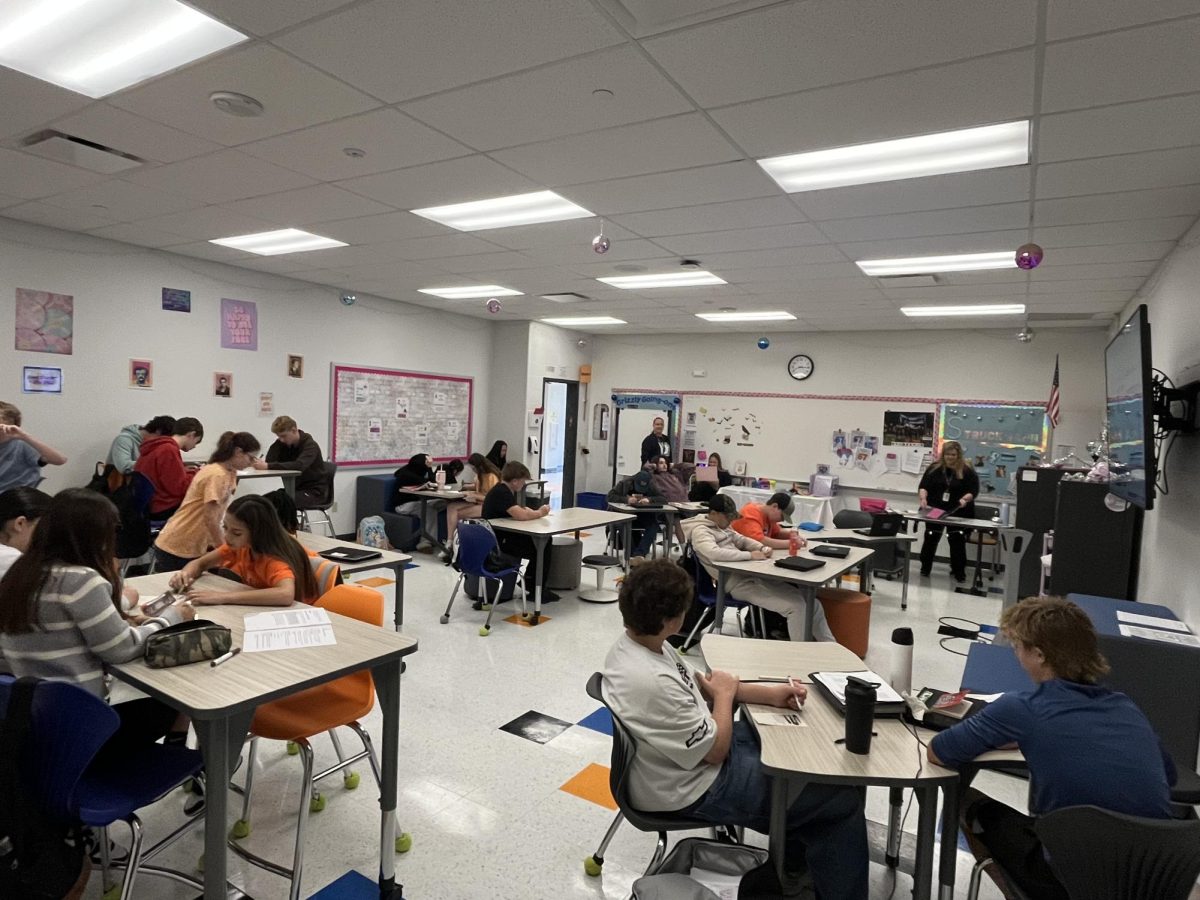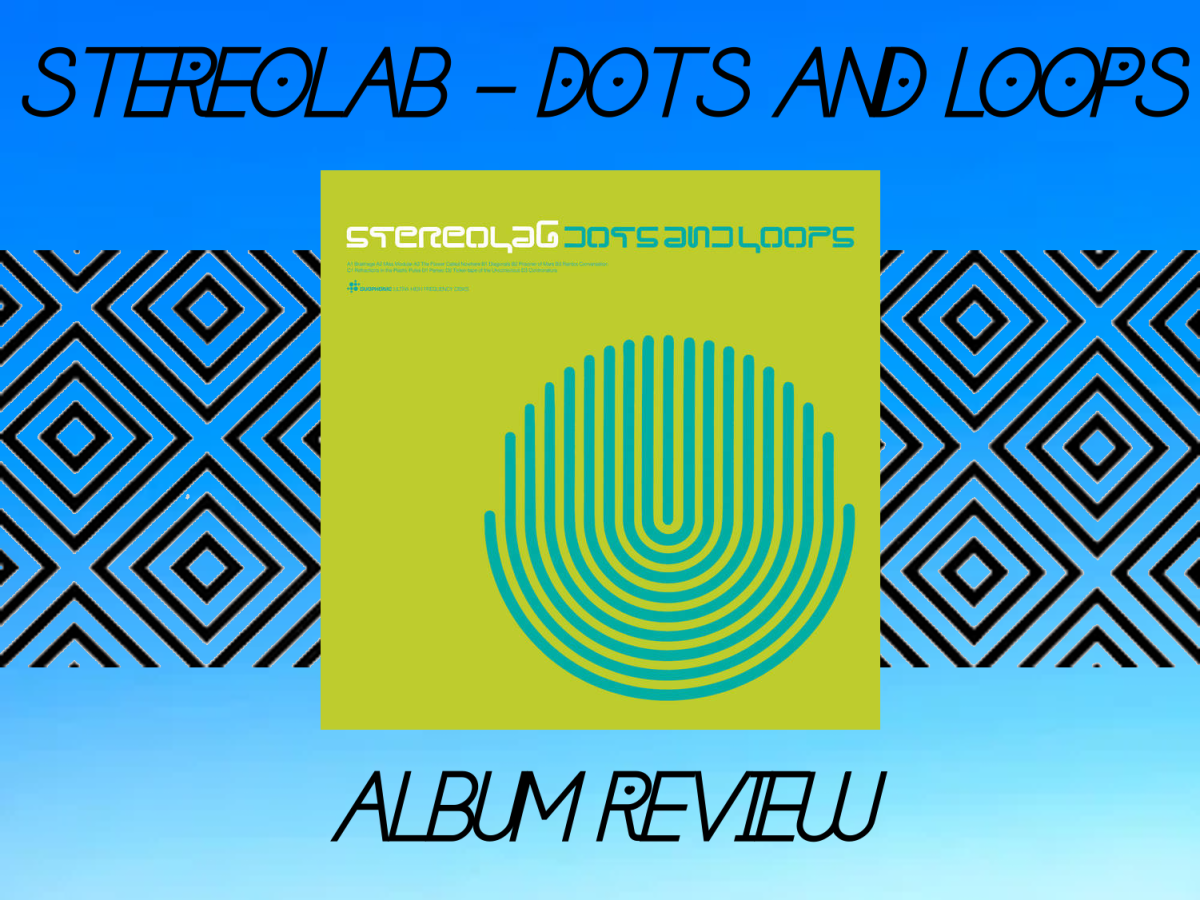Stereolab’s fifth album, “Dots and Loops,” feels almost dreamlike on first listen. It throws you a range of different atmospheric soundscapes that are deceivingly conventional, but so much more complex, with different mixes of 1960s pop along with bossa nova, and even a little jazz sprinkled in the mix. While again, it is relatively normal-sounding, at points it feels out of this world, as if elements of music from the past have collided with futuristic sounds and ideas.
The opener, “Brakhage,” immediately begins sets this tone, starting with what seems to be a vintage receiver looping and stopping, before thinning out and transitioning to a more jazz-centered melody. A vibraphone loop mixes with thin-sounding keys and skittering drums. As an intro, it stands out for being one of the most comfortable-sounding songs on the album, before transitioning to its more unique-sounding pieces.
Horns are used a lot within this album, with tracks like “Miss Modular,” “Parsec,” and “Ticker-Tape of the Unconscious” having almost triumphant sounding horn compositions that back up the minimal instrumentals to make them feel more lively.
My personal favorite instrumentals come from both “Rainbo Conversation” and “The Flower Called Nowhere,” with both having the most transcendent-sounding instrumentals. “Nowhere” has these small keys that continue to play over a larger melody of bass and what seems to be repeatedly shaking snow bells. There are even several moments of choir-like singing from backing vocalist Gina Morris that make this track feel larger than life.
Vocalist Lætitia Sadier shines as a major component to all of these songs off the album, with her calm and smooth voice often helping to paint the atmosphere of the album even more. It almost sounds like something you would hear from a vocalist in the 1960s, but it still brings this modern edge, or at least, modern for the album’s time in 1997.
“Rainbo Conversation” sees no difference, with easily Sadier’s vocals on the track sounding perfect with the bossa nova-esque melody in the background. I love how it slowly builds in its sound before becoming grand, but yet Sadier never gets louder, maintaining her tone over the high electronic harmonics and frantic drums.
Behind all these instrumentals though, Sadier manages to bring a stark contrast to these positive-sounding instrumentals with eerily foreboding lyrics. “Brakhage” alone could serve as an example to this, with its lyrics criticizing our overabundant consumerist desires that take over our lives.
As an album, “Dots and Loops” aims to explore the extents of the human mind when under the brooding weight of despotism and a capitalistic society.
“Miss Modular” and “The Flower Called Nowhere” both represent how that type of society can affect its people within it, with “Miss” insinuating the illusion it uses to trick people into falling for something desirable. “Nowhere” shows the effects of this with the representation of a group of sailboats on a chain, simply stuck there, and not sailing onward towards the deep ocean. I particularly love the sailboat metaphor in how it describes one’s psyche under that power of despotism, showcasing how you cannot, literally in the metaphor’s case, expand your horizons.
We see Sadier find different ways of exploring that mindscape by both appreciating the moments of true life we receive on “Diagonals,” only to fall right back into the same trapped hellscape on “Prisoner of Mars.”
The album battles back and forth with these things, with “Parsec” describing a visionary-like person falling into that same state the sailboat metaphor shows. Or, there is “Rainbo Conversation,” a slight detour in the album’s themes that portrays Sadier in need of romantic attention and affection.
I personally find “Refractions of the Plastic Pulse” the most interesting track music and theme wise, taking up a large portion of the album at 17 minutes long. It is split into four different parts, each sounding different melodically, but are all connected by the intricately produced sounds of vintage-sounding receivers and minimal loops of noise. Sadier, while singing multiple times, mainly repeats one verse, opening up the idea of an ideal mindset. One that insinuates that while some objectives in life may be challenging, you simply need a call to action to make a change.
This likely contributes to the one time Sadier does not repeat the same verse, vaguely describing the downside of a society filled with nothing but greed.
While this is a personal milestone among many on this album’s tracklist, it does bring up the biggest issue I have with it as a whole. While “Refractions” is an amazing statement following tracks such as “Prisoner” and “Nowhere,” it grinds the album’s pacing to a complete halt with its long runtime. Following this with “Parsec” was a bit daunting to me considering it is mostly an instrumental, and its themes are not necessarily clear through that time, despite its fast dub break and blaring horn making for what should be a standout.
“Contronatura” is the closer to the project, and while it is also nine minutes and split into two halves, as a song it does manage to bring this entire album to an interesting and rather foreboding close. Its first lyrics seem to call for somebody, saying that they can heal and get better, before fading out into the next half. I love how this song transitions from its different portions, as around the four to five minute mark the track itself fades except for more unnatural sounding ambient noises. While it seems a little pointless at first, it eventually begins to gain rhythm, and become the beat that plays over the instrumental.
Ladier brings the album to a close with the most obvious message, one that describes the exact society we have learned of its affects on throughout the entire piece. It is a society that she quite literally describes with despotism when singing, saying as if it is a fantasy-like dream, blocking its true form of a greedy and prison-like nightmare.
While the album itself can be a daunting task to listen all the way through, especially with its longer cuts, it also proves to be an out of this world experience that takes elements of past musical endeavors and mixes them with new, forward-thinking ideas. It is a relaxing yet unnerving piece that shows the unfiltered depths of a capitalistic society, and what it can and clearly has done to citizens within years and years after the album was released. For these reasons, I would give this album a seven to an eight out of ten.



























